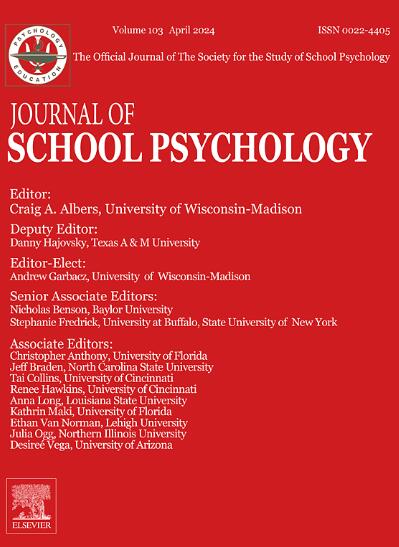“详尽而有效”:一项调查教师情绪与情绪劳动特征的多地点研究
IF 4.1
1区 心理学
Q1 PSYCHOLOGY, SOCIAL
引用次数: 0
摘要
教师经常经历和管理各种各样的情绪,以满足他们的职业要求。以往的研究主要集中在教师情绪或情绪劳动对教师幸福感和教学质量的影响上。本研究采用更全面的、以人为本的方法来识别具有不同情绪体验和情绪劳动倾向的教师群体。在第一项研究中,474名加拿大中学教师(女性占72.5%)被分为三种类型:情绪健康的深层演员、情绪健康的表层演员和情绪不健康的表层演员。情绪健康的深层演员报告的幸福水平最高,而情绪不健康的表层演员报告的幸福水平最低。在研究2中,85名德国中学教师(女性:57.6%)也观察到相同的概况。在这些教师中,情绪健康的表面演员被学生评为最支持的(n学生= 1327)。相反,情绪不健康的表面演员在教学质量(认知激活、课堂管理、学生支持)方面的学生评分最低。综上所述,我们的研究表明情绪劳动,特别是表面表演,具有双刃剑功能,既有积极的影响,也有消极的影响。一方面,它与教师幸福感下降有关,而另一方面,它有可能增强学生对教师支持的看法。本文章由计算机程序翻译,如有差异,请以英文原文为准。
“Exhaustive but effective”: A multi-site study investigating the profiles of teachers' emotions and emotional labor
Teachers routinely experience and manage a variety of emotions to meet the requirements of their profession. Previous research has primarily focused on how teachers' emotions or their emotional labor affects their well-being and teaching quality. The present study takes a more holistic, person-centered approach to identify groups of teachers with distinct emotional experiences and emotional labor tendencies. In the first study, 474 Canadian secondary school teachers (female: 72.5%) were categorized into three profiles: emotionally healthy deep actors, emotionally healthy surface actors, and emotionally unhealthy surface actors. The emotionally healthy deep actors reported the highest levels of well-being, while the emotionally unhealthy surface actors reported the lowest. The same profiles were observed in Study 2 with 85 German secondary school teachers (female: 57.6%). Among these teachers, the emotionally healthy surface actors were rated by students as the most supportive (Nstudents = 1327). Conversely, the emotionally unhealthy surface actors received the least favorable student ratings of teaching quality (cognitive activation, classroom management, student support). In conclusion, our study indicates that emotional labor, specifically surface acting, has a double-edged function, with both positive and negative implications. On the one hand, it is linked to diminished well-being among teachers, while on the other hand, it has the potential to enhance students' perceptions of teacher support.
求助全文
通过发布文献求助,成功后即可免费获取论文全文。
去求助
来源期刊

Journal of School Psychology
PSYCHOLOGY, EDUCATIONAL-
CiteScore
6.70
自引率
8.00%
发文量
71
期刊介绍:
The Journal of School Psychology publishes original empirical articles and critical reviews of the literature on research and practices relevant to psychological and behavioral processes in school settings. JSP presents research on intervention mechanisms and approaches; schooling effects on the development of social, cognitive, mental-health, and achievement-related outcomes; assessment; and consultation. Submissions from a variety of disciplines are encouraged. All manuscripts are read by the Editor and one or more editorial consultants with the intent of providing appropriate and constructive written reviews.
 求助内容:
求助内容: 应助结果提醒方式:
应助结果提醒方式:


